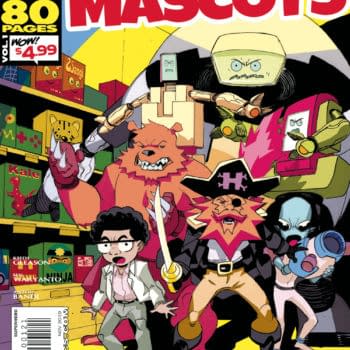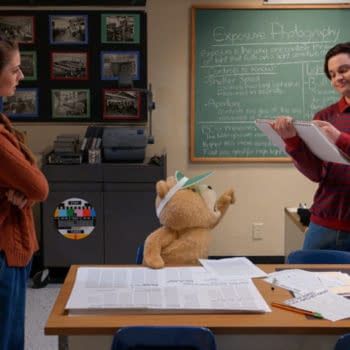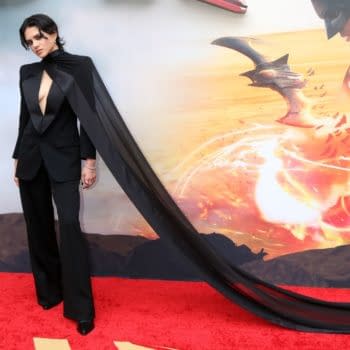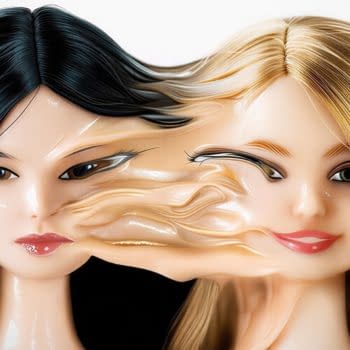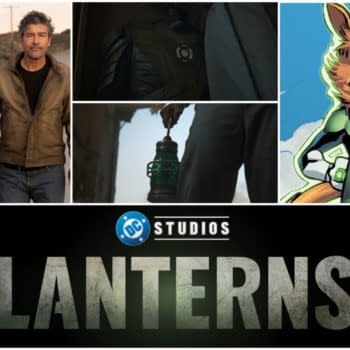Posted in: Movies | Tagged: be right back, charlie brooker, daniel rigby, Domhnall Gleeson, hayley attwell, jason flemyng, lenora crichlow, michael smiley, white bear
Dead Channel: Reflecting On Black Mirror Series Two
Alasdair Stuart writes for Bleeding Cool
I mainlined the entire second season of Black Mirror in one afternoon last week. I did it partially because I wanted to catch up and partially to see what watching all three episodes in quick succession brought to my attention. Seriously, if you ever want to see the tics and quirks of a writer's room laid bare, watch more than two subsequent episodes of anything in quick succession. Anything above average TV drama will reveal an entirely new structure to you as you watch it, and, if it's the early episodes, you'll see the Writer's Room figuring what they want to say and how they want to say it. What I found with Black Mirror AND what fascinated me about it was that all three episodes actually revolve around the same thing; reflections, and the lies they tell.
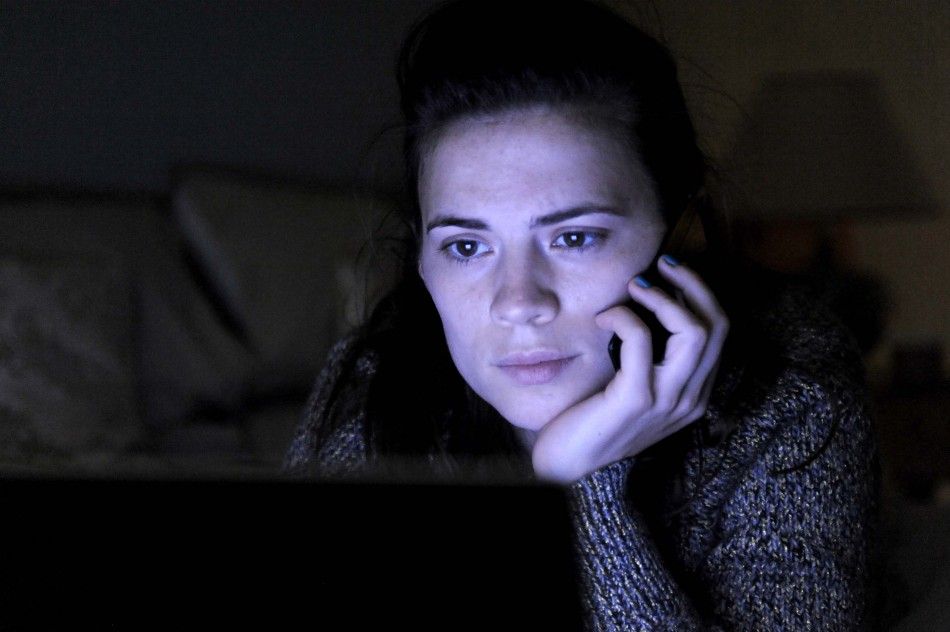
Look at Be Right Back, the first episode. A 'Facebook ghost story', its main plot was Martha, played with tremendous honesty by Hayley Atwell struggling to cope with the death of her boyfriend, Ash, played by Domhnall Gleeson. The opening scenes of this episode, contrasting their actually pretty happy life with the sudden, casual tragedy of Ash's death were a very British portrayal of grief as something you sullenly offer a sandwich to at the wake but never quite make eye contact with. It's what made the moment where the story curdled and turned, where her friend Sarah tells her there's a way she can talk to Ash even more disturbing. Grief is all well and good but hope? Hope's blasphemous in a situation like that.
Except of course she takes it.
And it works.
The idea of a service which amalgamates a 'ghost' of a dead loved one from their online life is arguably the best one Brooker has had to date. It's vintage Twilight Zone stuff but with a dilute shot of Max Headroom, a service so close you can almost see the spam emails about it. Well-meaning and, clearly, seductive, we see it draw Martha in, first to text communication with 'Ash' and then to audio. The episodes' sweetest moments came from what amounted to an extended telephone conversation, Martha walking the countryside whilst Ash, or something like him, chatted to her. There's a natural, rounded feel to a couple's conversations that almost no scriptwriter ever catches quite right, but Brooker absolutely nails it here. They're sweet and relaxed and the ghost even apologises like Ash would when she mentions something it has no experience of. Attwell is at her best in these scenes too, holding onto the fragile rope of communication she's been given because her life depends on it. I've been part of a long distance, now thankfully very short distance, relationship. I've spent hours on the phone and FaceTime and Gchat and I know the expression she's wearing in this scene very, very well. You're talking to your partner and therefore you're safe, you're home. Home is a fragile, tinny phone line or a glitching camera but that doesn't matter because when you're on it, and your partner's on it, that's the only place you want to be.
Except in this case, it isn't your partner anymore.
There's a moment all three of these stories share where someone really sees what's going on in their lives for the first time and is faced with a simple choice; accept it or change it. Martha, who by this stage has upgraded to the clone version, choose both. The other thing this series makes apparent is Brooker is very fond of risking everything in his third act and this is no exception. Ash is resurrected, sort of, alive, sort of and…it's not enough. The final scene, where Martha is screaming at him to kill himself even as he simulates a completely convincing plea for his life is chilling but what follows is worse. She spares his life but excises him from her own; forever the same, in the attic of the house, even years later. Ash is a reflection, a fake, but he's one she sees every time she closes her eyes, every time she hears him move, or speak. The 21st century's first digital ghost, making sure he's never more than twenty feet away from his activation point.
White Bear, the second episode, builds on this idea of the reflection that you know is fake but can't look away from and internalizes it within Victoria Skillane, the lead character. Initially told she's one of the only people unaffected by a signal which has turned most of humanity into mindless cameraphone voyeurs, Victoria flees from a group of semi-feral hunters with the aid of Jem and later Baxter. All three are unaffected, all three are united in their terror of the hunters and all three want the same thing; to get somewhere safe.
Except Jem doesn't trust Victoria.
And Baxter isn't taking them where they want to go.
And Victoria is starting to realize this has happened before…,
White Bear may be one of the best hours of TV produced this year. It's certainly one of the tidiest as, over the course of the episode we're shown, again and again, exactly how terrifying the images we cling to are. The initial scenario is pure John Wyndham stuff, even the grey weather and polite, mundane housing suggesting a 1970s BBC drama series. That all falls away as Baxter takes the women out to the woods to rape and torture them and it becomes a piece of late '90s survival horror. When they kill Baxter the situation changes again, and suddenly we're in an action movie, hurtling towards the boss fight as Victoria and Jem try and blow up the White Bear transmitter, to kill the signal in their area and then…
The lights go up, the stage splits and we're shown exactly what's been a reflection of the truth all along; everything. Nothing we've seen, from the very first moment Victoria opens her eyes is real. The entire episode is a reflection not just of the fictional tropes Brooker gleefully gallops through, but of our own fundamental need to be the hero or heroine of our own story. Victoria isn't a survivor, she's an accomplice, a criminal so psychologically weak she filmed her fiance torturing a child rather than taking part or trying to stop him. She's a voyeur. So it only makes sense that her punishment be to be watched, forever.
The last fifteen minutes of White Bear are amongst the most blisteringly angry pieces of television I've ever seen. Brooker first targets Victoria as a particularly vile stripe of violent criminal, then targets the audience as we see the Orwellian spectacle of a tearful, hysterical Victoria, in a black Popemobile-style transparent enclosure, being driven back down the road to where she first woke up. There, she's strapped in, again, drugged, again and falls asleep again to relive the same day again and again. Any other series would have left it there.
Brooker doesn't. Instead, he turns the vitriol on the audience and, by extension the other audience, the one we're part of. The revelation that White Bear is a 'justice park' where you can roam freely as drugged criminals like Victoria relive the most terrifying day they never had over and over is chilling in its banality. The final sequence, especially the always magnificent Michael Smiley delivering Baxter's welcoming speech to the audience, is horrific not just because of what Victoria's done or is being done to her but because of the people who are watching, who see nothing wrong with it. The people we're, by extension, sitting next to, patiently waiting for the horror to start. There are countless reflections in 'White Bear' but that one, the audience on screen mirroring the audience at home, is the one that stays with you.
White Bear also does something quietly subversive with its casting. Lenora Crichlow is best known in the UK as Annie from Being Human, where she consistently did very good work with a character who was, certainly for the first two seasons, desperately underwritten. To see her transformed into the panicked, desperate Victoria and, in turn, into the sort of woman who would video a child being tortured to death is a genuinely disturbing reflection of her normal roles. It's also something that follows on into The Waldo Moment, the final episode.
Here, the lead is played by Daniel Rigby, best known in the UK for a crushingly stereotypical set of telephone and internet ads. It's a shame too, because he's a fantastic actor, proved not only by this episode but his staggering turn as Eric Morecambe in the fantastic Eric and Ern a couple of years ago. Here he's cast as Jamie, a failed comedian who has found steady work, and growing fame, as the voice of Waldo, an animated satirical bear.
Waldo is every Channel 4 nightmare writ large, a blue, street-talking, filthy minded cartoon character who would have looked completely at home on the dismal 11 O'Clock Show. Here, he's cast as an animated Ali G figure, lampooning politicians for little more than weekly laughs and good ratings.
Until it's suggested he stand in a by election.
What follows is a combination of the dust-covered, passive aggressively polite horror show that is British politics and a look at what happens when a meme goes feral. Jamie, crammed full of self-loathing for his work and very real loathing for the people he's attacking, begins to gain new found confidence through Waldo and in one, chilling, throwaway moment responds to his producer saying he's gone too far by pointing at Waldo and saying 'HE SAID IT!'. Jamie himself is depressed, angry and directionless. Jamie speaking through Waldo is cheerfully immature, savagely eloquent and also very angry. He can't function in this arena, but through his reflection, through Waldo, he can conquer it.
The only problem is, Jamie isn't sure it deserves to be conquered. His halting romance with Gwendolyn Harris, the Labour candidate put up with the full knowledge she has no hope of winning, is sweet and doomed and the rant it inspires, the iconic line 'WHAT ARE YOU FOR?!' especially, is the point where Jamie and his reflection combine. Waldo evolves, live, on air, becoming the embodiment of Jamie's rage, not just at being dumped but at the ridiculous moral bankruptcy of modern politics. It's a bravura, fist pounding moment and it means, in the end, nothing. Because Waldo is a success, and successes get monetized and even as Jamie decides, in my opinion incorrectly, that Waldo is doing more harm than good in the system, Waldo is taken away from him. 'The Agency' approach them to use Waldo as a memetic assassin, a bloodless means of regime change and Jamie, horrified, quits halfway through a performance. Jamie's boss, Jack Napier (Yes indeed), played with broad grin menace by the excellent Jason Flemyng takes over and almost the first words out of his, and Waldo's, lips are:
'Five hundred quid to the first person to hit him.'
Waldo goes feral, a meme rampaging across the world. Irreverence and disrespect for those unworthy of anything else replaced by a smiling bear on the tailplane of fighter aircraft and a world crushed beneath an amiably filthy, blue bear's paw.
Like White Bear, The Waldo Moment is lousy with reflections. Waldo is a reflection of not just Jamie's rage and disenfranchisement but of whoever is speaking through him. Jamie, and through him Waldo, echo the combination of distrust, apathy and rage so many people feel at the nature of British politics. Finally, as in White Bear, the voters, the audience, are us. Easy to distract, easy to control and in the end, easily led. Perhaps most tellingly the Politicians are worryingly accurate reflections of how British politicians come across; dead-eyed career politicians and ruthlessly ambitious candidates.
Black Mirror's not a cheerful show. You may be able to tell. However, it's frequently very funny and the dissection and expansion of ideas, and the way they're married to very real, identifiable emotions is unlike anything else on TV. Brooker's talked a lot about how the show is meant to reflect the side effects of technology, arguably the one drug we're all addicted to, and these three episodes certainly bear that out. They feature a virtual ghost, a virtual self-image, a park where you can laugh at criminals and a blue bear as the symbol of political revolution and, in the end, the political status quo. They all reflect from each other and the audience to create arguably the 21st century's first truly great British drama series. If you haven't seen it, please do. Everything else is just a pale reflection.



